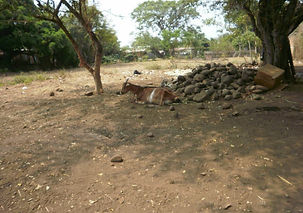
Compost Methods to Improve Soil Fertility

GardenES from Garbage
Project
Summary
The aim of this two-year project is to improve soil productivity through composting methods, in order to replenish nutrient-poor soils, which have diminished plant growth, increased erosion, and disrupted natural runoff. All these issues affect not only the environment but also the economy of the community since most people depends on agriculture to earn a living. To accomplish this goal, We have devised inexpensive and effective soil conditioners that recycle organic waste materials: compost piles, compost teas and mulches.


What inspires us is CHANGE. Jardines de la Nueva is a small and newly urbanized area that is suffering serious consequences for having strong clay soils. Can you imagine living in a place where vegetation cannot grow?
Poor harvests are affecting our families’ economy. All of this makes us feel committed to take the initiative and start working! We want to see happier and healthier families. We want to train people, develop a more broadly change in our community; create a deeply connected and organized community willing to make a real environmental transformation. We have done our best to help people realize that the issues with our soils can be alleviated and that our success depends on our efforts.
Goals and Sustainability
1
2
3
4
5
6
7
8
•Educate communities about how composting is an important element of organic gardening and agriculture, and that it provides a diversity of environmental, social and economic benefits.
•Develop a plan of operation that outlines the procedures for conducting a Community Composting Project. Teach families in the community the basic procedures for making compost at home.
•Improve soil productivity through three composting methods in order to replenish nutrient-poor soils, which have diminished plant growth, increased erosion, and disrupted natural runoff.
•Create compost piles/teas and mulches as a community, demonstrating to people that natural materials can be recycled and we’ll have helped alleviate soil problems ourselves.
•Help people create a system that best fits their plants’ needs and space availability. Help families find a suitable outdoor site to locate the compost.
•Create a nutrient-rich food product for our gardens to improve soil structure, maintain moisture levels, and keep our soil's PH balance in check while helping to suppress plant disease. Using compost will reduce the need of fertilizers and pesticides.
• Cause a positive impact in the community. Be an example for others. The idea of composting is going to be spread in other neighboring communities so they’ll be encouraged to start composting as swell.
•Extend composting benefits beyond the garden, motivating even those without a green thumb to take up this efficient and old agricultural practice.

What inspires us?
BACKGROUND
Location

Problems to Address
“Jardines de la Nueva”, is an underdeveloped community located in Sonsonate, El Salvador. It’s inhabited by approximately 250 people. This small community has a significant problem with its soil: the only soil texture present is clay. Clay particles are the smallest and finest particles in soil, making it heavy and decreasing its aeration.
Once it rains, puddles form to produce mosquito larvae and soils stay wet longer, which drowns plants. When this soil dries out, it cracks, making it hard for plants' roots to penetrate the soil and grow as extensively as they must to thrive.
Another critical challenge in the community is the garbage pollution. Since this is a very rural community, we don’t have a garbage dump or a truck that can pick the garbage up and take it somewhere else.
People daily burns and throw away garbage to creeks. We are unconsciously polluting air, water and soil.
These issues contribute to a lack of vegetation in garden soil, widespread infertility for harvesting and unappropriated habits that have adversely affected the economy, environment, and health of the community.





